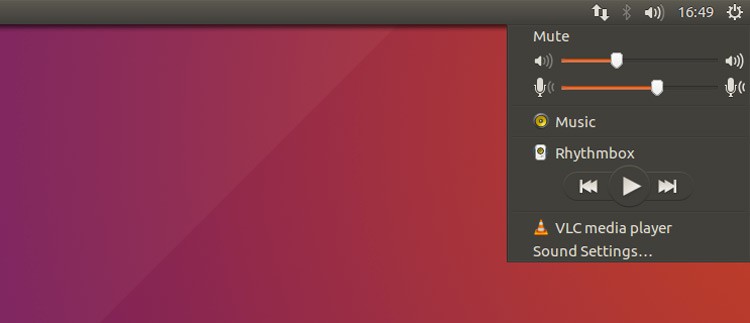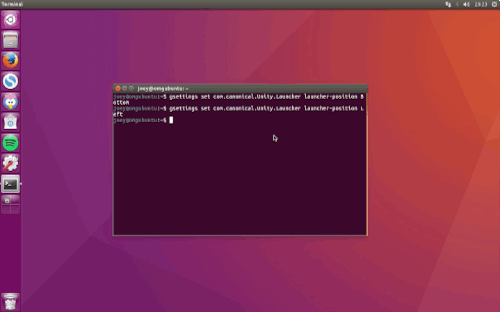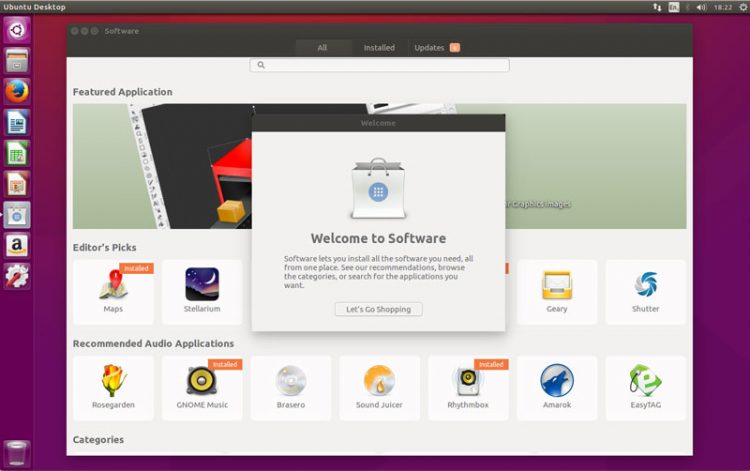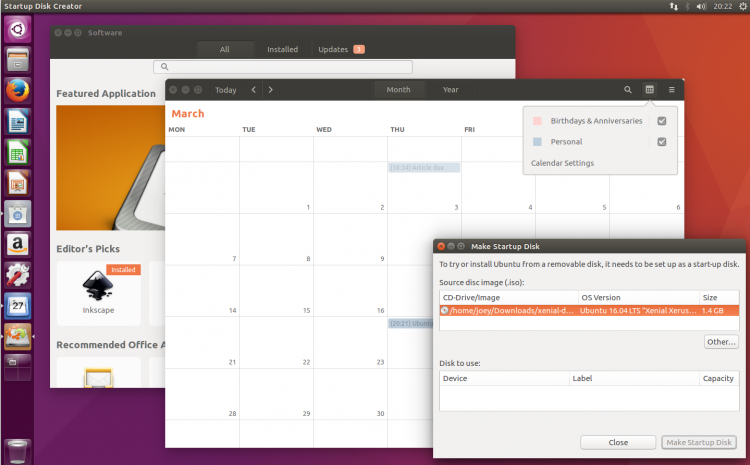Ubuntu 16.04 LTS - Review.
The Ubuntu desktop has seen very little change since Ubuntu 14.04 LTS was released two years ago. That’s about to change with the recent launch of Ubuntu 16.04 LTS—code-named “Xenial Xerus”—which brings big changes and welcome polish to the classic Unity 7 desktop.
What’s new for the traditional Linux desktop
If you’re using the Unity 7 desktop—now Unity 7.4—you’ll have a better experience than ever before. Those controversial online search results—which some people called “spyware”—are now disabled by default. Ubuntu won’t send your local searches over the Web to show you shopping results anymore.
If you’re using the Unity 7 desktop—now Unity 7.4—you’ll have a better experience than ever before. Those controversial online search results—which some people called “spyware”—are now disabled by default. Ubuntu won’t send your local searches over the Web to show you shopping results anymore.
Unity 7 also now, at long last, lets you move your launcher to the bottom of the screen. The feature is hidden and requires a terminal command, but it’s officially supported. Unity 7.4 brings a variety of other little improvements and bits of polish that make this a satisfying revamp.
The aging Ubuntu Software Center is now gone, replaced by the shiny new GNOME Software application that Fedora has been using for several releases. In addition to traditional Deb packages, Ubuntu now supports “Snaps,” which can be installed alongside Debs. Because they’re self-contained packages that can include their own dependencies, Snaps can’t mess with the rest of your system. They’ll be ideal for installing proprietary software or the latest versions of big open-source projects—like desktop environments—without risk.
Ubuntu’s Unity desktop has never been more polished and user-friendly.
There’s good and bad news for AMD graphics users. Ubuntu 16.04 LTS will support AMD’s new AMDGPU graphics driver architecture, which should help close the gap with Nvidia’s exceptional Linux drivers. Unfortunately, Ubuntu 16.04 LTS no longer supports the current AMD Catalyst driver, also known as “fglrx.” AMD graphics card users may want to stick with Ubuntu 14.04 until AMDGPU has matured. That is, if you’re using the card for gaming or other demanding chores. AMD graphics will work just fine if you’re performing standard desktop activities.
Where’s Unity 8 and the converged desktop?
Ubuntu 16.04 LTS stands as a solid traditional Linux desktop that will serve users for the next few years. Still, convergence features, which blur the lines between desktop and mobile devices, are slowly arriving. That’s part of the Unity 8 desktop, which is now stable enough that it’s shipping on the first Ubuntu tablet, although it’s still early days for this software.
Ubuntu 16.04 LTS stands as a solid traditional Linux desktop that will serve users for the next few years. Still, convergence features, which blur the lines between desktop and mobile devices, are slowly arriving. That’s part of the Unity 8 desktop, which is now stable enough that it’s shipping on the first Ubuntu tablet, although it’s still early days for this software.
The Unity 8 desktop isn’t included on Ubuntu 16.04 LTS by default, but it’s available to install from the repositories as a preview. If all goes as planned, Ubuntu 16.10 will feature Unity 8 by default, giving Ubuntu developers a whole two-year development cycle—until the next long-term service release, Ubuntu 18.04 LTS—to improve the new desktop and make it ready for a general Linux desktop audience. Until then, Ubuntu users have a lot to enjoy with the current Unity desktop.
Ubuntu 16.04 — New Features
Linux Kernel 4.4
It introduces numerable improvements to system stability, performance, power efficiency, and file system handling, and introduces support for newer Intel and AMD hardware.
- Improved Intel Skylake processor support
- 3D support in the virtual GPU driver
- New driver for Corsair Vengeance K90
- Support for TPM 2.0 chips
- Journaled RAID 5 support
It also introduces drivers for the Logitech G29 racing wheel and enables support for hardware features on some newer Toshiba laptops.
ZFS
A bigger (and somewhat controversial) change is the addition of support for the Zfs filesystem on Linux — the first version of Ubuntu to support it natively, out of the box.
ZFS is best described as a combination of a volume manager (like LVM) and a filesystem (like ext4, which remains the default for Ubuntu installations).
Ubuntu has produced a reference guide to help those interested in filesystems take advantage of ZFS on Xenial.
Other System Changes
Python 3.5 is default in 16.04. Apps that are based on and/or use Python 2 remain available and will continue work as normal. Developers are advised to upgrade their software to take advantage of Python 3.
As we’ve previously warned, if you use a device with AMD Radeon graphics hardware you should NOT upgrade at present. The fglrx driver is now deprecated in 16.04, and although open source alternatives (radeon and amdgpu) are recommended, they do not deliver comparable performance.
Snappy is Ubuntu’s brand new packaging format. It aims to help app developers bring newer versions of their apps to the Ubuntu desktop, instantly, reliably and safely.
We took a look at the key benefits of Snap packages in an earlier post, which is well worth a read for a full rundown.
But the short of it is this: you will get to install new versions of your favourite apps in Ubuntu sooner than before, and without having to worry about missing or out of date dependencies.
New Keyboard Shortcuts
The default shortcut for opening the HUD (the ‘heads-up display’ that lets you quickly search for options in the menu of focus applications) changes from ALT to ALT+SPACE in this release.
The window control keybinding changes from alt-super.
Unity 7.4
Unity is Ubuntu’s default desktop shell. A host of bug fixes for some long-standing issues feature in its latest outing.
Yes, as you may have heard by now, Ubuntu 16.04 finally lets you move the Unity launcher to the bottom of the screen — six long years after users first asked.
The ‘option’ to change the position is not exposed via the native system settings app, instead lurking in the nerdy nether regions of the dconf-editor. Third-party utilities like Unity Tweak Tool (available from Ubuntu Software) offer an easier, one-click toggle, however.
Ubuntu’s controversial online search features are now disabled by default for new installs.
A victory for the privacy conscious,you’ll no longer need to sift through tangentially related eBay, Wikipedia and web results when hunting down a local file or app.
Session shortcuts have been added to the Dash to make it even faster to reboot, logout or shutdown your PC.
Other changes in Unity 7.4:
- Removable devices now have launcher shortcuts
- ‘Format’ option added to device quicklist
- Improved appearance of apps that use CSD
- New app spread shortcut: Super + Ctrl + W
- Window management fix for Trash
- New HUD shortcut: Alt + Space (previously just ‘Alt’)
- Option to ‘Always Show Menus’ in System Settings
- Dash: new overlay scrollbars
- Improved HiDPI support
- Apps now show launcher icons while loading
LTS to LTS Changes

Easily create desktop shortcuts
Changes since Unity 7.2 (used in Ubuntu 14.04 LTS)
Since a good chunk of you will be doing an upgrade from Ubuntu 14.04 LTS we’ll mention some other notable tweaks to the desktop shell since the version you’re used to was released.
Among them:
- App menus can be made to ‘Always Show’
- Faster login & logout animations
- New overlay scrollbars (no more thumb scrubber)
- Drag and drop apps from the Dash to the desktop to create shortcuts
- Computer can no longer be ‘shutdown’ when the screen is locked
- Dash: Keyboard navigation improvements
- New setting to control the show-now delay (when pressing Alt key)
The Sound Menu will show a microphone input volume slider on devices with a built-in (or connected) microphone. In earlier versions the input slider was only shown when the microphone was actively in use by an application.

New Default Wallpaper
Almost every new version of Ubuntu comes with a new desktop background and a selection of new community-contributed wallpapers.
The default desktop background is a palatable mish-mash of purple, though far removed from the heady days of the Hardy Heron! Whether you keep it or change it, the new default desktop wallpaper will at least make it easier to spot Ubuntu in the wild!
Application Updates
Several new apps ship as part of Ubuntu 16.04 LTS, including a new desktop calendar app and a brand-new software store (pictured above).
Both are welcome additions to the desktop, with Calendar able to show your upcoming appointments and reminders in the Datetime Indicator.
The new Software app replaces the Ubuntu Software Center. Use it to search for, browse and install from hundreds of thousands of free and open-source application, as well as a few non-open-source and paid apps, too.
It’s not perfect — it doesn’t always mark installed apps correctly, it leaves behind dependencies on uninstalls — but these bugs will be fixed in subsequent updates.
The Cheese webcam booth lets you — surprise — take screen-lit selfies using your webcam.
The latest releases of Mozilla’s Firefox web-browser and Thunderbird e-mail client are (naturally) also included, as are new versions of other key apps like LibreOffice, Evince and the Eye of GNOME image viewer.
- Firefox 45
- Thunderbird 38
- Chromium 48
- LibreOffice 5.1
- Nautilus (aka ‘Files’) 3.14.2
- Totem (aka ‘Videos’) 3.18
- Rhythmbox 3.3
- GNOME Terminal 3.18
- Eye of GNOME 3.18
- Shotwell 0.22
Two apps you will no longer find on new installs are the disc-burning utility Brasero and the instant-messaging client Empathy.
Both have been removed from the ISO image.
If you’re upgrading from an earlier release note that these apps won’t be uninstalled.
Unity 7 once again removes ammunition for its critics to fire.
Xenial is an agreeable release. It’s a desktop operating system that’s as well suited for end users as it is developers as it is mainframes like the IBM LinuxOne.
Many often think of “convergence” as being solely a smartphone that becomes a PC. But from smartphones to supercomputers, Ubuntu is already converged.
With a support period of five years, the lure of new apps through the promising Snappy package system, and the very best hardware support, the case for not upgrading is pretty thin.
Ubuntu 16.04 LTS in a nutshell:
- Improved Unity desktop
- Online searches disabled in Dash
- Linux Kernel 4.4
- New Software store
- Updated apps, inc. LibreOffice 5.1
- New desktop calendar app
- Support for ZFS
- Python 3.5
In our opinion this new release is worth the upgrade and can be downloaded from:
http://releases.ubuntu.com/16.04/









No comments:
Post a Comment